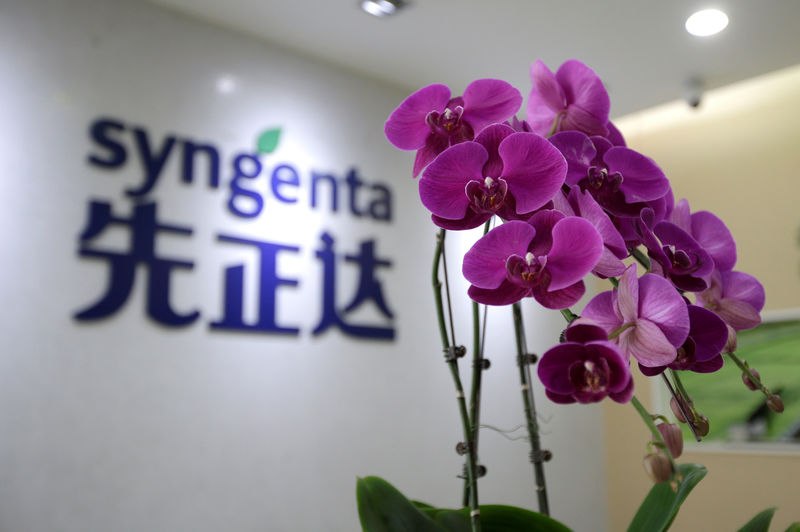By Dominique Patton
BEIJING (Reuters) - A year on from Syngenta's $43 billion (32.73 billion pounds) purchase by ChemChina, the seed and chemical giant is leveraging its new status as a Chinese company to grow its tiny share of the highly fragmented China market.
The former Swiss firm is targeting growth through acquisitions in the $17 billion Chinese seed market, where access is restricted for foreign players, as well as new products and collaborations in technology.
It hopes its edge in the world's second-biggest farm inputs market will help it catch bigger global rivals in seeds, Monsanto (MX:MON) and DowDuPont (N:DWDP) in the wake of a round of consolidation in the agricultural products sector.
"Over time, we want to challenge into being in the number two position [in seeds]," Andrew Guthrie, Syngenta's regional director for China told Reuters in an interview, with the firm currently a "distant number three" in seed sales globally.
The firm, the global leader in crop chemicals, also hopes to grow its chemicals business in China, where it currently has about 7 percent of the market and is one of market leaders.
The acquisition of Syngenta, China's biggest foreign takeover to date, came as Beijing looks to new technology to boost farm productivity, as well as reduce the use of chemicals on heavily polluted soil.
That has already driven strong demand for products such as seed treatments, which reduce the amount of pesticide needed on a plant later on. Syngenta has invested $2 million in expanding its seed care service in Beijing this year, said Guthrie.
There has also been a rise in demand for seeds with specific traits designed to withstand pests, drought or which suit mechanical harvesting.
EYES ON TARGETS
Syngenta is eyeing acquisitions in all areas, "but primarily in corn and vegetable [seeds], where we see our two largest opportunities," Guthrie said.
The firm currently accounts for less than 1 percent of China's seed sales, and its 49 percent-owned corn hybrids joint venture, Sanbei Seed, established in 2008, lags behind a DowDuPont venture with Shandong Denghai Seeds Co. (SZ:002041).
However, Guthrie said having ChemChina as a parent is helping to open doors in a crowded industry, which had as many as 4,600 seed companies at the end of 2015.
Sanbei remains key to the firm's growth strategy, he said, partly through new products, such as four new corn varieties in October, two of which are suited to combine harvesting.
CORN CHALLENGES
Syngenta's local ownership will also give it an entry to genetically modified crops, once the market opens, with foreign companies not permitted to develop crops with GMO traits, even within a Chinese joint venture.
"This is an advantage for Syngenta. They can get into the GMO market through their parent," said an executive at another major seed company.
It has established a new venture with fast-growing Yuan Longping High-tech Agriculture Co. Ltd (SZ:000998), backed by state-owned conglomerate CITIC, to develop and sell new varieties of corn, including with GMO traits.
Guthrie expects cultivation of GMO corn crops to win the go-ahead early in the next decade, giving the company time to develop and test new products that it already deploys in other international markets.
Industry analysts say Syngenta will need to take a role in tackling some of the challenges besetting China's corn sector, such as overcapacity and inventory overhang, if it hopes to take a leading position.
Despite falling corn acreage, the market is still suffering from a huge inventory of seed, as well as approvals for hundreds of similar varieties, the widespread use of counterfeit seed and illegal planting of GMO crops.
"One of the biggest problems is overcapacity, especially in corn," said Sun Jingyan, an analyst at Rabobank.
Better regulation of such a turbulent market will need to involve Syngenta itself, said a Chinese seed industry veteran.
"They will need to bring best practice to the seed industry, and that means working with local governments," he said, declining to be named because he is not allowed to speak with media.
